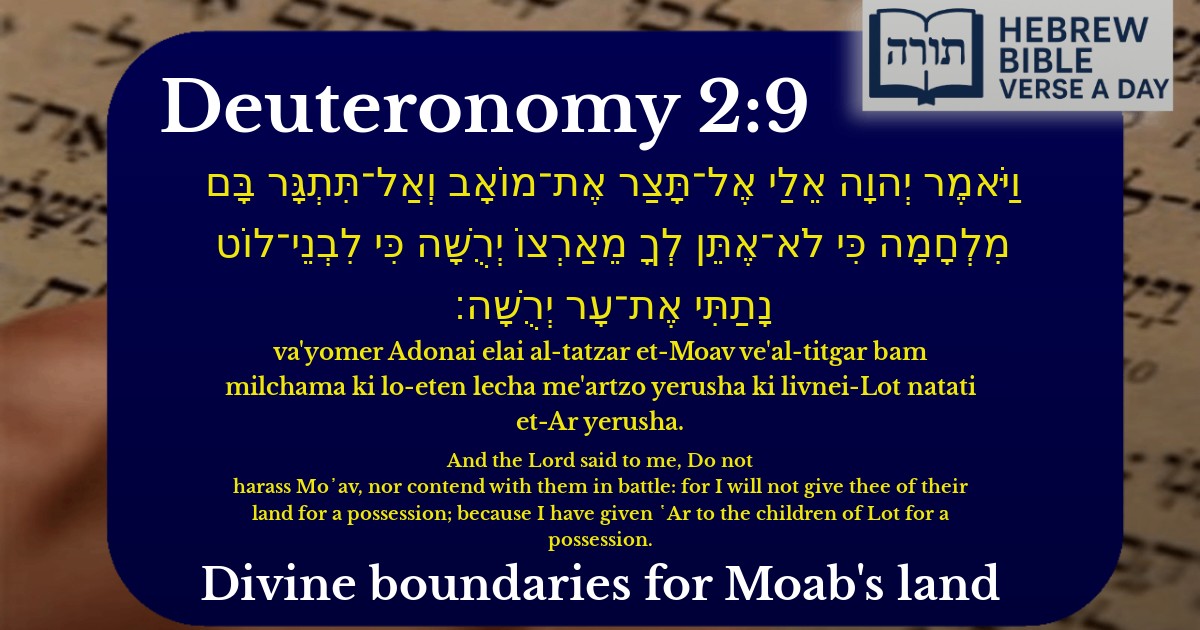Join Our Newsletter To Be Informed When New Videos Are Posted
Join the thousands of fellow Studends who rely on our videos to learn how to read the bible in Hebrew for free!
Hebrew Text
וַיֹּאמֶר יְהוָה אֵלַי אֶל־תָּצַר אֶת־מוֹאָב וְאַל־תִּתְגָּר בָּם מִלְחָמָה כִּי לֹא־אֶתֵּן לְךָ מֵאַרְצוֹ יְרֻשָּׁה כִּי לִבְנֵי־לוֹט נָתַתִּי אֶת־עָר יְרֻשָּׁה׃
English Translation
And the Lord said to me, Do not
harass Mo᾽av, nor contend with them in battle: for I will not give thee of their land for a possession; because I have given ῾Ar to the children of Lot for a possession.
Transliteration
Va'yomer Adonai elai al-tatzar et-Moav ve'al-titgar bam milchama ki lo-eten lecha me'artzo yerusha ki livnei-Lot natati et-Ar yerusha.
Hebrew Leining Text
וַיֹּ֨אמֶר יְהֹוָ֜ה אֵלַ֗י אַל־תָּ֙צַר֙ אֶת־מוֹאָ֔ב וְאַל־תִּתְגָּ֥ר בָּ֖ם מִלְחָמָ֑ה כִּ֠י לֹֽא־אֶתֵּ֨ן לְךָ֤ מֵֽאַרְצוֹ֙ יְרֻשָּׁ֔ה כִּ֣י לִבְנֵי־ל֔וֹט נָתַ֥תִּי אֶת־עָ֖ר יְרֻשָּֽׁה׃
וַיֹּ֨אמֶר יְהֹוָ֜ה אֵלַ֗י אַל־תָּ֙צַר֙ אֶת־מוֹאָ֔ב וְאַל־תִּתְגָּ֥ר בָּ֖ם מִלְחָמָ֑ה כִּ֠י לֹֽא־אֶתֵּ֨ן לְךָ֤ מֵֽאַרְצוֹ֙ יְרֻשָּׁ֔ה כִּ֣י לִבְנֵי־ל֔וֹט נָתַ֥תִּי אֶת־עָ֖ר יְרֻשָּֽׁה׃
🎵 Listen to leining
Parasha Commentary
📚 Talmud Citations
This verse is not quoted in the Talmud.


Context of the Verse
This verse (Devarim 2:9) appears in the Torah as part of Moshe's recounting of Bnei Yisrael's journey through the wilderness. Hashem instructs the Israelites not to provoke or wage war against Moav, as their land was divinely designated for the descendants of Lot.
Rashi's Explanation
Rashi (Devarim 2:9) clarifies that Moav was protected from conquest because they were descendants of Lot, Avraham Avinu's nephew. Hashem had already granted them the territory of Ar as an inheritance. Rashi further notes that this prohibition was temporary—later, in the time of David Hamelech, Moav was subdued when they acted with hostility toward Israel (see Shmuel II 8:2).
Rambam's Perspective
In Hilchot Melachim (5:1), the Rambam codifies that certain nations, including Moav, were initially forbidden to attack unless they provoked war first. This halacha reflects the principle of divine allocation of lands to nations, as stated in this verse.
Midrashic Insights
Halachic Implications
The Gemara (Chullin 60b) discusses why Ammon and Moav were singled out for this prohibition, linking it to their ancestral connection to Lot. The Sages derive from this verse that nations related to Israel (through Avraham) were granted certain protections unless they acted as enemies.
Moral Lesson
The Kli Yakar (Devarim 2:9) teaches that this command demonstrates Hashem's faithfulness to His promises—even to the descendants of Lot. It serves as a reminder that divine justice extends to all nations, not just Israel, and that territorial rights are determined by Hashem's will.